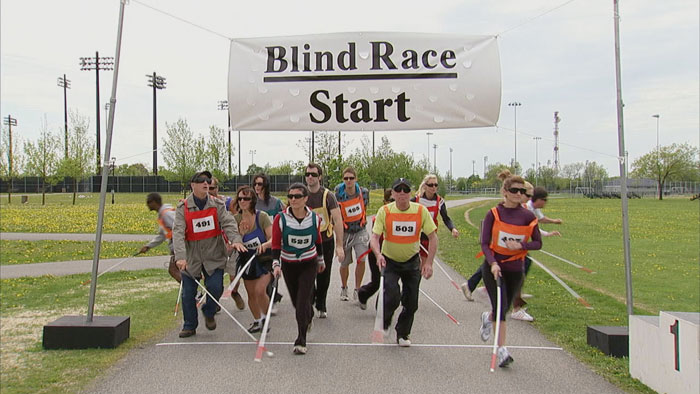
On a warm Friday in May, unperturbed by the light morning drizzle, a small crowd of people wearing jogging shorts and dark sunglasses gathers near the baseball diamond in Montreal’s Jarry Park. The odd dog walker or cyclist passing by takes little notice, even as the joggers prepare themselves—stretching, adjusting their racing numbers, carefully tracing their canes over the ground. Above them, a white banner explains the absurd: “Blind Race Start.”
In an unmarked blue truck nearby, forty-two-year-old filmmaker Jean Kohnen surveys the scene via three not particularly well-hidden cameras beneath makeshift hunting blinds in strategic locations. An old hand at Just for Laughs Gags, Kohnen jokes with the technical director and the prop girl, who’s knitting at the back of the truck. He spots a possible victim. On his cue, the show’s enthusiastic primary actor, Denis Levasseur—both instantly familiar and impossible to place—begins tapping his cane on the pavement and yelling in French (he reserves his heavily accented English for the cutaways), “Hello! Is there someone who can help me? ”
In the hierarchy of comedic respectability, the hidden-camera gag lies somewhere near the bottom, about on par with bumper sticker puns and Eddie Murphy fat-suit humour. After nine, going on ten seasons and 4,000 pranks, however, Quebec’s Just for Laughs Gags has refined the silent gag into a form as disciplined and tightly structured as the sonnet: hook a victim, force him or her to react to a ridiculous situation, and then reveal the camera. Stitch six or seven of these interactions into a minute-and-a-half segment, set it to bouncy music and a laugh track, and you’ve got one of Canada’s most successful cultural exports. Talk to a cabbie in Laos or a bartender in Germany and chances are they’ve never heard of Alice Munro or Atom Egoyan. They may, however, have seen Denis Levasseur dressed in an army officer’s uniform, emerging from an exploding outhouse with his pants around his ankles.
Out in the park, an African-Canadian man in a camouflage baseball cap bikes up to the joggers. Kohnen begins feeding Levasseur lines through an earpiece. “We’re having a race, just a minute and a half of your time. Will you help us? ” he murmurs, like a demented Cyrano de Bergerac. Levasseur in turn tells the victim to stand on a podium, fire the starting shot, and then use the megaphone to guide racers back on track if they stray. “Remember,” he says earnestly, “if we get off the path, please tell us.”
The victim obediently climbs onto the podium and holds the starter’s pistol above his head. At the sound of the gun, the joggers immediately scatter in every possible direction, a dozen white canes sweeping fluidly through the air. “Pull in!” says Kohnen, and the camera zooms in to capture a moment of exquisite confusion on the victim’s face before he begins frantically shouting directions through the megaphone. Inside the truck, the crew is in stitches. Even the prop girl puts down her knitting. “Yes! That was a great reaction,” says Kohnen. “It worked even better than I thought.”
After thirty seconds of confusion, Levasseur moves in for the punchline. Putting his arm around the bicyclist, he whips off his glasses and points to the camera with a big grin, holding on for an extra beat to squeeze that last laugh from the victim. “It’s never funny when the gag looks mean,” Kohnen explains, so a happy reaction shot is as vital as the joke itself. This particular victim doesn’t disappoint, pumping his fist in the air and throwing his head back in laughter. “Next time I see your program on TV, I am happy all night!” he says, before riding off into the park.
Between takes, while the extras eat Timbits at a picnic bench, Kohnen smokes and tweaks the scene. He wants one of the errant joggers to re-enter the shot, crossing behind the victim, to ramp up the absurdity. The Luxembourg-born director is plugging away on his first feature film—a comedy about an unsuccessful immigrant comedian that Kohnen calls “somewhat autobiographical”—but in the meantime he has made himself a connoisseur of hidden-camera humour. Britain’s turn-of-the-century Trigger Happy is, for example, infinitely more sophisticated than Toronto-born comedian Howie Mandel’s new prank show Howie Do It. And Surprise surprise, a popular Quebec production through the Chrétien era, pranked celebrities far more creatively than MTV’s Punk’d. “All their situations are ‘Oh, you have drugs in your car, you have this, you have that,’” says Kohnen. “The victims always end up calling their lawyer. You never really get into their heads.”
Over the next three hours, the crew snags half a dozen victims, ending up with decent reaction shots from most. The final catch of the day is a fresh-faced jogger in sleek spandex. As Levasseur gives her his spiel, she bounces in place, hands on her hips, annoyed at the prospect of a drop in her heart rate. Only after she fires the pistol and the racers scatter does she stop abruptly. “Ca c’est correct?” Levasseur shouts as he disappears over a small hill. “Stop!” she yells back. “Everyone! Stop!” In the distance, a single jogger passes through the shot while Kohnen cheers in the truck.
When Levasseur whips off his sunglasses, puts his arm around the woman’s shoulder, and points at the camera, however, she just scowls. Levasseur tightens his grip and grins, trying to ingratiate himself. “Yes,” Kohnen whispers in his ear. “Stay on her.” Levasseur’s smile is starting to look frozen, so he kicks it up a gear, howling as if he and the victim were old friends sharing an inside joke. Finally, the woman breaks, shaking her head in disbelief. “Don’t cut away,” Kohnen tells the camera guy. A few exasperated chuckles give way to genuine laughter. “Stay with her,” says Kohnen. “Stay with her.”

